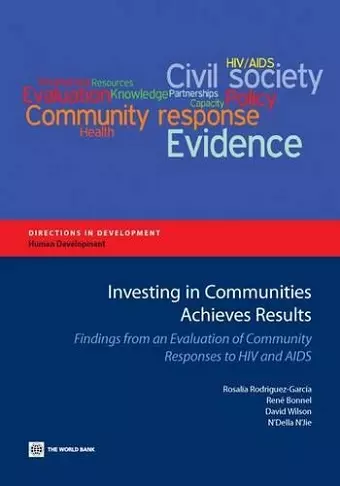Investing in Communities Achieves Results
Findings from an Evaluation of Community Responses to HIV and AIDS
David Wilson author Rosalia Rodriguez-Garcia author N'Della N'Jie author Rene Bonnel author
Format:Paperback
Publisher:World Bank Publications
Published:22nd Jan '13
Currently unavailable, and unfortunately no date known when it will be back

Investing in Communities Achieves Results fills an important gap in the global knowledge on community level results and resources related to HIV and AIDS. While communities, in spite of their limited resources, have played a key role in the HIV/AIDS response, their contributions and innovative approaches to prevention, treatment, care, and support have not always been the focus of systematic and rigorous evaluations. To address this deficit, a series of studies-including evaluations in Burkina Faso, India, Kenya, Lesotho, Nigeria, Senegal, South Africa, and Zimbabwe-were undertaken over a three-year period (early 2009 to early 2012), helping to build a robust pool of evidence on the effects of community-based activities and programmes.A unique feature of this multicountry evaluation was the collaboration between two international organisations (the World Bank and the United Kingdom's Department for International Development) and a major civil society network (the U.K. Consortium on AIDS and International Development). Other attributes that contributed to the successful outcome were the sustained consultation process with civil society and stakeholders at the local, national, and global levels, and the collaboration among high-calibre, multi-disciplinary researcher teams.The book's findings are promising. At varying levels, depending on the country context, the HIV response in communities was shown to improve knowledge and behaviour and increase the use of health services- and even decrease HIV incidence. Evidence on social transformation was more mixed, with community groups found to be effective only in some settings. Each study in the evaluation provides a partial view of how communities shape the local response; however, taken together they constitute a significant pool of rigorous evidence on the contributions of communities, community groups, and civil society to the national and global HIV and AIDS response. The studies suggest that communities have produced significant results at the local level, which contribute to outcomes at the national level.
ISBN: 9780821397411
Dimensions: unknown
Weight: unknown
144 pages